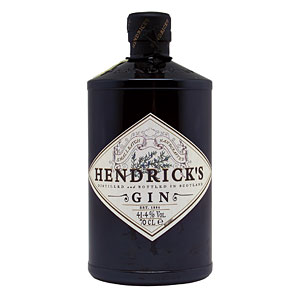
hendricks, l
(article, Kim Carlson)
I’ve just discovered Giles Coren, and I’m nearly as pleased about it as I was when I discovered another British (Scottish, actually) diversion, Hendrick’s gin. What red-blooded American woman wouldn’t love someone named Giles Coren? Actually, this London restaurant reviewer is such a blast to read — and so on target — that he could be called Karl Rove for all I care. His review of the forward-thinking restaurant Acorn House made me want to book a flight to London. (Don’t worry — it was mere fantasy.) [%image hendricks float=left size=small caption="Hendrick's gin"] In his latest review, Coren sizes up a gastropub called the Fat Badger, but not before he spends several paragraphs blasting the billions of bottles of water Brits buy annually. (And what the Brits quaff is a mere fraction of what Americans glug.) As Coren so pointedly writes, clean drinking water is unavailable to millions, and yet many of us lucky enough to have it come right to our taps still want bottled water sourced, packaged, and shipped (at staggering cost in both resources and money) from places like Fiji. His argument against bottled water is forceful, to say the least, and it may even get the attention of restaurateurs — especially now that he’s turning it into a factor in his reviews. Coren bases his ratings on a complicated mathematical computation, but basically, places will get a big fat zero in the “water” category if they don’t, in Coren’s words, “offer me tap water, politely, unsarcastically, and before they offer mineral water . . . The only bottled water I will tolerate will henceforth be Belu – sourced and bottled in Shropshire, sold in glass or fully degradable plastic made from a corn derivative which can be composted back to soil in 12 weeks, and all of whose profits go to fund drinking-water projects in India and Africa and river-cleaning projects in Britain.” So there. [%image water-bottles float=right caption='A mess of water bottles'] The problem is more advanced in Europe than in the U.S; in my (admittedly limited) experience you must request tap water in most European countries, where bottled water is standard. (The water question, in other words, isn’t “Bottled or tap?” but “Still or mineral?”) Asking for tap water can elicit an uncomfortable pause on the waiter’s part, as if you’d just asked for the leftovers from the next table — until you remember it’s water, for heaven’s sake. But we Americans shouldn't gloat. On Powells.com, Jay Weinstein, author of The Ethical Gourmet, writes about the same subject, albeit with a softer touch: “Thirsty travelers turn to bottled water on trains and in flight. Sometimes carrying a refillable water bottle doesn't make sense. And in countries where municipal water is impure or possibly harmful, bottled water is a wise choice. For storage in an emergency situation, certainly a supply of bottled water makes sense. And yes, in a fine-dining setting, sometimes the flavor of imported mineral water makes it an appropriate complementary beverage. But to stockpile cases of disposable plastic bottles for routine home use, as more and more Americans are now doing, is shortsighted and unnecessary. Bottled water is the fastest-growing sector of the U.S. beverage industry. We can do better.” As my two teenage daughters take turns saying, “Duh.” I know, I know, it’s quick and convenient to grab a cold one and run, but is it really worth it? The bottle itself will be around for millennia (unless maybe it’s Belu); the fossil fuels burned to ship something available at the tap are warming the planet at a startling rate; and the small fortune we save when we forego bottled water could be collected and sent to WaterPartners International to help on the international water front. It’s a late date for making resolutions for the new year, but Coren has inspired me. I henceforth renew my resolve not to buy bottled water, except on that rare occasion when I really, really, really need a drink (and Hendrick’s gin doesn’t fit the bill). Raise your Nalgene to Coren. He’s on to something.

hendricks, l

water-bottles, l